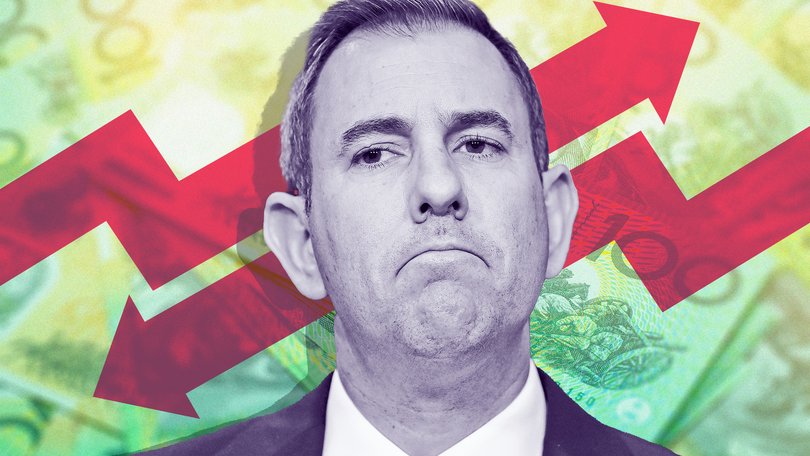JACKSON HEWETT: Nab quarterly wellbeing survey shows tax cuts aren’t helping with consumer confidence
The Government has spent billions on relief measures but time is running out for Treasurer Jim Chalmers to convince Australians they’re better off.

Fourteen million people will receive an average income tax bump of nearly $2000 this year, but the payout doesn’t appear to be paying off in terms of consumer sentiment.
National Australia Bank’s quarterly wellbeing survey is the lowest it has ever been in the ten years the bank has been polling consumers, showing heightened levels of financial anxiety and fear about the future. The only other time it was this low was at the start of the pandemic.
It’s grim news for Treasurer Jim Chalmers, who this morning spruiked that “Australians are earning more and keeping more of what they earn under Labor.”
Sign up to The Nightly's newsletters.
Get the first look at the digital newspaper, curated daily stories and breaking headlines delivered to your inbox.
By continuing you agree to our Terms and Privacy Policy.The Government’s largesse is effectively going unrewarded in consumers’ minds.
And he is running out of time to convince them it is making them better off.
Westpac has calculated that 75 cents in every dollar of tax cuts is going into bolstering savings balances that have been beaten down by higher for longer interest rates and the increased cost of essentials. Ordinarily, the bank said 50 per cent would be saved and the rest spent.
“After going backwards over the last few years, households are using the current rebound in income to rebuild their finances. The risk is that they continue to do this until real income levels are back around pre-shock levels,” Westpac economist Jameson Coombs said.
The bank doesn’t forecast that happening until 2026, which explains why a lack of security about the future is contributing to elevated levels of anxiety, as seen in NAB’s wellbeing survey.
“Eight in ten Australians are trying to actively save because they know they’ve drawn down some of that savings buffer,” Mr Pearson said. “So the inability to raise $2000 in an emergency is the big concern that most Australians have.”
And despite spending billions on cost of living relief, including electricity rebates and childcare subsidies, the Government isn’t seeing any significant return on investment in terms of consumer sentiment.
“Handouts like electricity relief don’t feel impactful because they’re not tangible cash drops. People don’t notice bills being slightly smaller as much as they notice a large lump sum.”
It must be absolutely infuriating for Dr Chalmers, particularly given the tax cuts are equivalent to three interest rate cuts, according to Westpac.
Beaten down consumers, who became accustomed to tightening their belts, are still highly attuned to an uncertain economy.
“People are managing their stress with cost of living by cutting back and drawing down savings, but it’s not making them feel particularly good,” Mr Pearson said, explaining that daily reminders of inflation have an outsized impact on wellbeing.
“They will base it on a few things that are highly visible that they can’t avoid spending money on. So things like petrol, where there’s a big reminder of the price on a big banner every time they drive around the corner. Electricity is another one, because it’s big, lumpy, and unavoidable. So people will extrapolate from a few key prices across the broader spectrum to what inflation is doing.”
Low confidence in the economy
NAB’s survey showed negativity across the economic spectrum.
Half of Australians surveyed believe there is more chance of recession and higher unemployment. Two-thirds expect further rises in inflation, six in ten anticipate higher taxes and government charges, and four in ten predict interest rates will continue to rise.
With growing uncertainty over the future, four in ten believe their quality of life will fall.
Even though the economy is showing signs of revival, NAB said the message is not landing.
“With the past few years being so tumultuous, they are finding it hard to believe there’s really any reprieve on the horizon,” Mr Pearson said.
Despite the country’s low unemployment rate, consumers remain wary of potential economic shocks, particularly given the recent strain on household savings.
“The one indicator of our consumer surveys that is starting to become more elevated is job security,” National Australia Bank’s Dean Pearson explained. “Now, unemployment is really low, but consumers aren’t silly. They know that the big variable in this is if unemployment spikes, that would be a real hit to them, particularly their ability to manage this savings buffer that has been drawn down.”
That uncertainty means the tax cuts are not filtering through to the wider economy, which suggests why sectors such as retail and hospitality are continuing to suffer. Westpac estimates that the average tax benefit is $830, rather than the Treasurer’s estimate of $1888, which means the average spend is $205.
“There is a risk of prolonged period of stagnant consumption growth as consumers put most of their marginal income gains towards saving rather than spending,” Mr Cootes said.
Missing vision
NAB’s survey suggests that consumers are crying out for an optimistic future.
That is most keenly felt by the country’s youth, who are increasingly worried about securing a stable financial future in the face of poor housing affordability and stagnant wage growth.
The survey found that the top concern for 18 to 24-year-olds is their ability to fund retirement.
Without a coherent, forward-looking vision, Australians are left in a state of uncertainty, which continues to fuel anxiety and dampen consumer sentiment.
“It’s very hard to tell people things are going to get better until they start to feel things are going to get better,” Mr Pearson said.
“People need a clear vision of where the country is headed. Without it, they fall into a negative position.”

